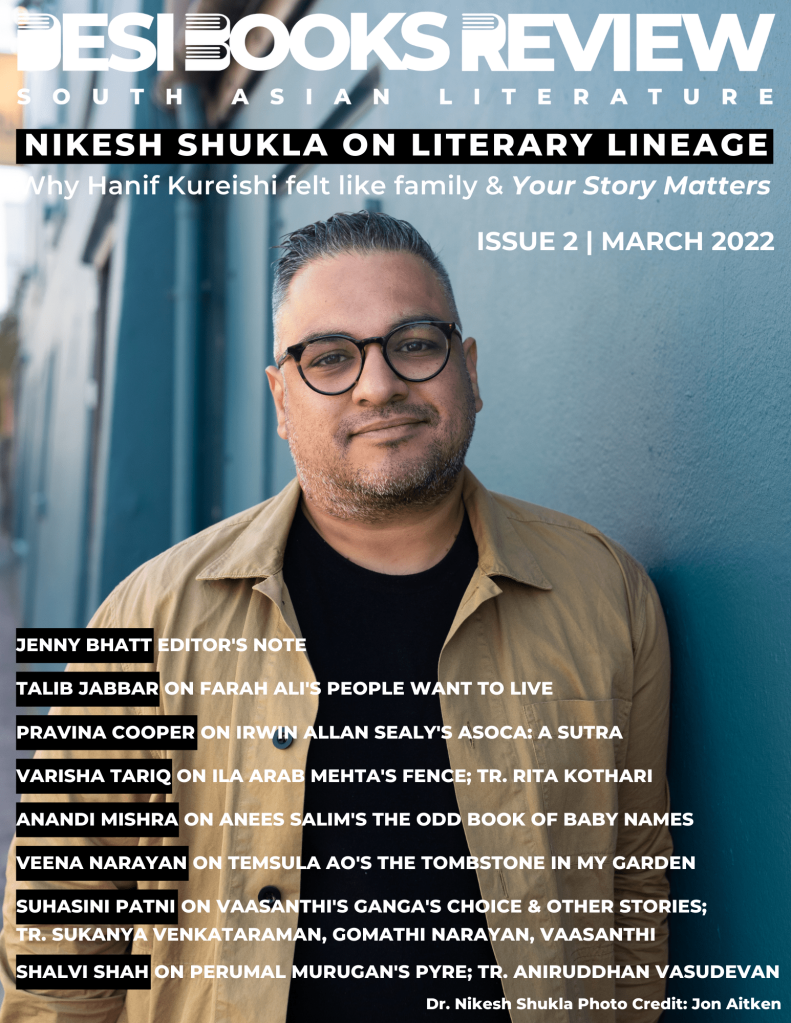Introducing #DesiBooksReview Issue 2
Editor: JENNY BHATT

Dear Reader,
Welcome to the second issue of Desi Books Review.
In the editor’s note of our first issue, I had described briefly how and why this review came into existence. That first issue went beyond all expectations both in terms of the quality of essays from freelance reviewers and readership numbers. We also received some helpful feedback from a few loyal community members and you’ll see some changes in this new issue as well as in upcoming issues.
Most notably, you’ll see desi poets, writers, and translators featured on these covers from now on. Why? For the simple reason that we don’t get to see them celebrated on magazine covers much at all. Further, we want to shine a light on those who have made their mark in ways that go beyond their books. [Note: We’ll do these cover features either through personal essays or interviews or conversations.]
It is most fitting then that the first author ever on a Desi Books Review cover is Dr. Nikesh Shukla. Like many, I discovered Nikesh and his work through social media. His outspokenness and activism in matters of race, racism, immigration, immigrantism, publishing, and more have shown me and many others ways to speak our truth as well. He’s also a prolific writer: in addition to three novels, two young adult books, and a memoir, he has co-edited at least three essay collections. And he’s a journalist and a scriptwriter. Oh, we’re not done yet. He co-founded the Jhalak Prize for British (and British resident) writers of color, teaches creative writing, has mentored several emerging writers, and regularly amplifies the works of other writers of color on social media. His latest book, Your Story Matters, is out this month. So we’re thrilled to share an excerpt from it as our feature essay on literary lineage. Certainly, Nikesh sets a rather high bar for literary citizenship. But, if each of us could follow his example in just one or two meaningful ways, we could collectively create a more inclusive, equitable, and efficient publishing ecosystem.
Speaking of inclusivity and equitability, almost all the books featured in this issue are connected by those themes too. Three novels, three story collections, and one novel-in-stories take us across Pakistan, Nagaland, Tamil Nadu, Gujarat, Mysuru, Mumbai, the US, and even go back in time. Three of these books are translations into English from influential writers within contemporary Tamil and Gujarati literary traditions. Although not planned as such, it’s interesting how this turned out to be an all-fiction issue. As Pankaj Mishra wrote recently at the London Review of Books:
No matter how potent and compelling our facts and ideas, we will still want to explore our moral and emotional lives: the intimate realm where the individual stands shorn of vain ideology, full of contradiction and irresolution. We can be most precisely known, and vividly revealed, even through blindingly fast historical change, by imaginative literature. Fiction will continue to speak its truths in the post-truth age.
Pankaj Mishra, “Fiction in a Post-Truth Age,” London Review of Books Blog, February 16, 2022
Our reviewers’ insights on how we might approach and engage with all of these books certainly address many aspects of the personal and the political, the present and the past, the contemporary and the classic.
Dr. Pravina Cooper writes about how Irwin Allan Sealy’s contemporary, postmodern version of the Buddhist Emperor Ashoka is different from the historical version we may know and why that matters. She writes: “If you are seeking exotic historical settings, period authenticity, royal intrigue, minutiae of palace life, the novel will disappoint.” The success and power of Sealy’s writing lies in how he gets us to accompany his Asoca “through the range of his moral dilemmas: his own fallibility, his compromised self, his sense of his own ephemeral place in history.” Reading Cooper’s review made me think of how we need more such historical novels that re-situate these ancient legendary figures in our present culture in ways that make us understand both our past and our present better.
Anees Salim’s The Odd Book of Baby Names also has an introspective ruler of a near-historical, semi-fictional kingdom. But, as Anandi Mishra tells us, Salim wants us to focus on the patriarch’s children through nine closely-linked narratives in this novel-in-stories. And how the “cinematically immersive world” of this novel might just be “the oasis of calm” we need in our lives right now. I’m the kind of reader who wants a book to leave me unsettled long after I put it down. Mishra assures us, at the end of this review, that the “calm” she’s describing is actually a quiet space opening up that allows us to think more meditatively on the complexities Salim presents.
If the mention of “stories” made you perk up, we have some collections here too. There’s Temsula Ao’s The Tombstone in My Garden: Stories from Nagaland. Veena Narayan writes about how these five fable-like tales are “. . .best for a quiet evening when the others have gone out, the day’s work is done, and the sky is gradually darkening. The stories are like gooseberries soaking in an earthen jar of saline, alongside spicy kanthari chillies.” Books described with food analogies should be a review subgenre of its own and we will make sure that Narayan, if she reviews for us again, includes at least one such food analogy in every review.
Or, perhaps, you’re drawn to books considered in terms of their literary lineage. In his review of Farah Ali’s debut story collection, People Want to Live, Talib Jabbar writes about how this latest addition to Pakistani literature “is party to the new Anglophone afsana, drawing on Urdu traditions but joining more recent collections, such as Daniyal Mueenuddin’s In Other Rooms, Other Wonders and Mira Sethi’s Are You Enjoying?” Rather than doing what a western critic would have done with an implied or actual Lahiri short story tradition comparison—somewhat tiresome now, right?—I’m glad Jabbar took his analysis in this direction to open up a different—and, frankly, more interesting—critical conversation.
Our third collection, Ganga’s Choice and Other Stories, is from the Tamil writer, activist, and journalist, Vaasanthi. It spans her long career and has been translated from Tamil into English by Sukanya Venkataraman, Gomathi Narayan, and the author herself. Suhasini Patni writes how the book “does not seek to do away with folklore or traditions that handicap feminism. Instead, it asks us to do the hard work of thinking through the myths we have inherited as truths and to reinterpret rather than demolish them.” Patni also gets into an fraught issue within translator circles: footnotes. Whichever side of this never-ending debate you might be as a reader or writer or translator, you’ll find her examples worth considering.
Another Tamil writer who likes to make us think about our own biases is the celebrated Perumal Murugan. His latest, Pyre, has been translated from Tamil into English by Aniruddhan Vasudevan. This is the story of an inter-caste couple and those familiar with Murugan’s body of work will know that caste and gender discrimination are perennial themes. As Shalvi Shah tells us, though, “Murugan’s intention may only be to make us think. How wonderful would it be to take it as a call to action.” Shah’s review is a brilliant reminder that our reading should, in the end, lead to changed behaviors and actions. Because what is thinking or thought without acting or action?
Varisha Tariq issues just such a personal and direct call to action. Revisiting Ila Arab Mehta’s Fence, a novel translated from Gujarati into English by Rita Kothari, Tariq shares her own family’s five-year struggle to buy a house—much like that of Mehta’s protagonist, a young Muslim woman facing discrimination due to her religion, gender, and class. Tariq reminds us that “India’s education system is still in need of a revolution that will take it beyond literacy and job opportunities in a globalized knowledge-based economy. Such education is like putting a powerful weapon into someone’s hands without teaching them how to use it. If we teach the classroom about the facts and histories of bigotry against a community, we also have to examine the impact of such bigotry on that particular community.”
Allow me to end on a personal note too. I’ve been a book reviewer for years. With these two issues of Desi Books Review, I’ve taken on the review editor’s role. Working with the writers of these essays has involved some profound conversations about the books in question and the writers’ responses to them. This kind of editorial back-and-forth with an invested reader-writer as they work to articulate how a book has moved them is a profound conversation and, often, we both articulate things we might not have done otherwise. It is a different level of engagement for me with desi literature and I approach all of it with careful attention and a sense of responsibility. With every review published, my impulse to grow the readership of all of these books and their related essays also grows stronger. I hope that, someday soon, Desi Books and Desi Books Review will have a regular masthead of enthusiastic, smart, committed folks so we can go from a quarterly publishing cadence to something more frequent and include more amazing desi books from around the world.
For now, I hope that you will go read these review essays, get the books they’ve discussed, and tell other reader friends about all of it. Thank you.
Do share your thoughts about this second issue. If this kind of review aesthetic is your thing, you can pitch reviews here. We’d love to include reviews of poetry collections and nonfiction that goes beyond memoir.
And, finally, if you’d like to get regular updates about more such reviews and other literary matters, please sign up here.
Stay healthy, keep reading, and write well.
Jenny Bhatt
Editor-in-Chief, Desi Books
Back to #DesiBooksReview Issue 2
Join the Conversation
